|
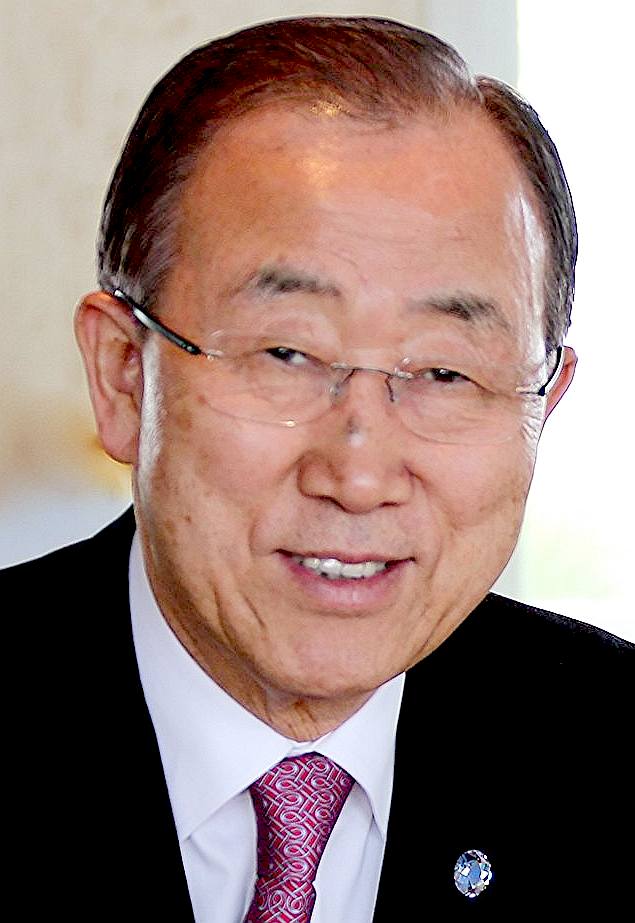
CONFUCIAN
- During his tenure at the South Korean Foreign Ministry, Ban's nickname was
jusa, meaning "the Bureaucrat" or "the administrative clerk". The name was used
positively and negatively: complimenting Ban's attention to detail and administrative skill while deriding what was seen as a lack of charisma and subservience to his superiors. The South Korean press corps calls him "the slippery eel", for his ability to dodge questions. His peers praise his understated "Confucian approach", and he is regarded by many as a "stand-up
guy." Ban is known for his "easy smile". He will need all of his
skills if the UN is to assist the Global Ocean Commission to police our
oceans.
Ban
is quoted as saying: The world is "living in an era of unprecedented level of crises," Ban Ki-moon told the United Nations General Assembly in
September 2014. Guiding the 193-member organization through those crises -
an Ebola epidemic that has killed some 5,000 people; more than 800,000 displaced by the Ukraine conflict; the "genocide threat" of ISIS; and reported use of UN facilities by Palestinian militants, to name a
few - has been Moon's job as secretary-general for the past seven years.
One of the Secretary-General’s first major initiatives was the 2007
Climate Change Summit, followed by extensive diplomatic efforts that have helped put the issue at the forefront of the global agenda. Subsequent efforts to focus on the world’s main anti-poverty targets, the Millennium Development Goals, have generated more than $60 billion in pledges, with a special emphasis on Africa and the new Global Strategy on Women’s and Children’s Health. At the height of the food, energy and economic crises in 2008, the Secretary-General successfully appealed to the G20 for a $1 trillion financing package for developing countries and took other steps to guide the international response and protect the vulnerable and poor.
Ban Ki-moon (Hangul:
반기문; hanja:
潘基文) is the eighth and current Secretary-General of the United Nations after succeeding Kofi Annan in 2007.
He was born on the 13th of June 1944. Before becoming Secretary-General, Ban was a career diplomat in South Korea's Ministry of Foreign Affairs and in the United Nations. He entered diplomatic service the year he graduated from university, accepting his first post in New Delhi,
India. In the foreign ministry, he established a reputation for modesty and competence.
Ban was the foreign minister of South Korea from January 2004 to November 2006. In February 2006 he began to campaign for the office of Secretary-General. Ban was initially considered a long shot for the office. As foreign minister of
South
Korea, however, he was able to travel to all the countries on the United Nations Security Council, a maneuver that turned him into the campaign's front runner.
On 13 October 2006, he was elected to be the eighth Secretary-General by the
United Nations General Assembly. On 1 January 2007, he succeeded Kofi Annan. Ban struggled in his first month to adjust to the culture of the United Nations, but quickly found his bearings and passed several major reforms on peacekeeping and UN employment
practices. Diplomatically, Ban has taken particularly strong views on global warming, pressing the issue repeatedly with U.S. President
George W.
Bush, and on the Darfur conflict, where he helped persuade Sudanese president Omar al-Bashir to allow peacekeeping troops to enter Sudan.
Ban was named the world's 32nd most powerful person by the Forbes list of The World's Most Powerful People in 2013, the highest among South Koreans.
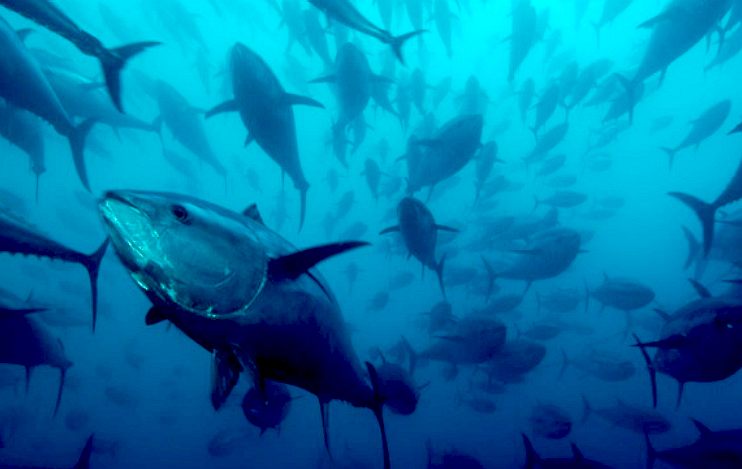
FISH
RESPONSIBLY - Bluefin
tuna is an endangered species as a result of ocean neglect. The UN's food
and environment
divisions work together to ensure sustainability in this regard.
UNITED
NATIONS In February 2006, Ban declared his candidacy to replace Kofi Annan as UN Secretary-General at the end of 2006, becoming the first
South Korean to run for the office. Though Ban was the first to announce a candidacy, he was not originally considered a serious contender.
Over the next eight months, Ban made ministerial visits to each of the 15 countries with a seat on the Security
Council. Of the seven candidates, he topped each of the four straw polls conducted by the United Nations Security Council: on 24 July, 14 September, 28 September, and 2 October.
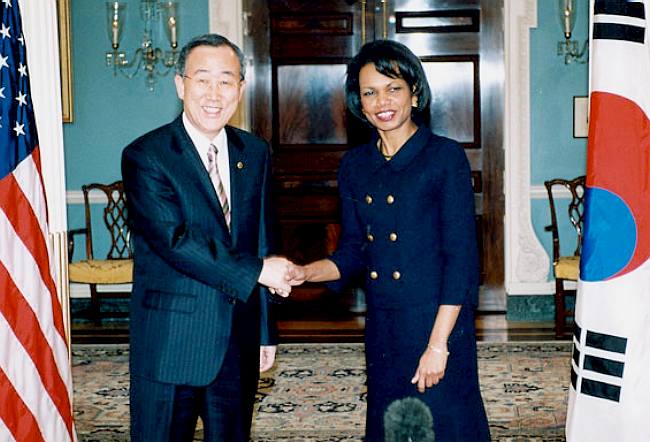
During the period in which these polls took place, Ban made major speeches to the Asia Society and the Council on Foreign Relations in New York. To be confirmed, Ban needed not only to win the support of the diplomatic community, but also to be able to avoid a veto from any of the five permanent members of the council: People's Republic of
China, France, Russia, the United Kingdom, and the United States. Ban was popular in Washington for having pushed to send South Korean troops to Iraq, and had the support of the Bush administration as he pursued the position. But Ban also opposed several U.S. positions: he expressed his support for the International Criminal Court and favoured an entirely non-confrontational approach to dealing with North Korea. Ban said during his campaign that he would like to visit North Korea in person to meet with Kim Jong-il directly. Ban was viewed as a stark contrast from Kofi Annan, who was considered charismatic, but perceived as a weak manager because of problems surrounding the UN's oil-for-food program in
Iraq.
Ban struggled to win the approval of France. His official biography states that he speaks both English and French, the two working languages of the UN Secretariat. He has repeatedly struggled to answer questions in French from journalists. Ban has repeatedly acknowledged his limitations at French, but assured French diplomats that he was devoted to continuing his study. At a press conference on 11 January 2007, Ban remarked,
"My French perhaps could be improved, and I am continuing to work. I have taken French lessons over the last few months. I think that, even if my French isn't perfect, I will continue to study it."
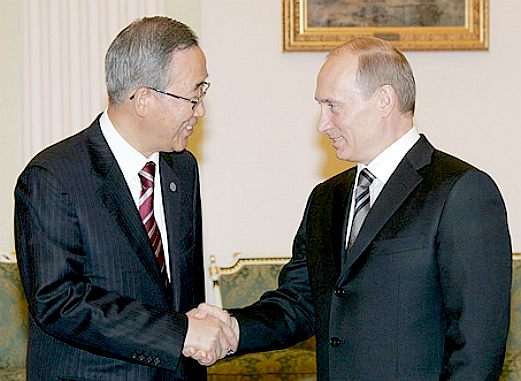
As the Secretary-General election drew closer, there was rising criticism of the South Korean campaign on Ban's behalf. Specifically, his alleged practice of systematically visiting all member states of the Security Council in his role as the Minister of Foreign Affairs and
Trade to secure votes in his support by signing trade deals with
European countries and pledging aid to developing countries were the focus of many news articles. According to The
Washington
Post, "rivals have privately grumbled that Republic of Korea, which has the world's 11th-largest economy, has wielded its economic might to generate support for his candidacy". Ban reportedly said that these insinuations were "groundless". In an interview on 17 September 2006 he stated: "As front-runner, I know that I can become a target of this very scrutinizing process", and that he was "a man of integrity".
In the final informal poll on 2 October, Ban received fourteen favorable votes and one abstention ("no opinion") from the fifteen members of the Security Council. The one abstention came from the Japanese delegation, who vehemently opposed the idea of a Korean taking the role of Secretary-General. Due to the overwhelming support of Ban by the rest of the Security Council,
Japan later voted in favor of Ban to avoid controversy. More importantly, Ban was the only one to escape a veto; each of the other candidates received at least one "no" vote from among the five permanent members. After the vote, Shashi Tharoor, who finished second, withdrew his candidacy and China's Permanent Representative told the UN
reporters that "it is quite clear from today's straw poll that Minister Ban Ki-moon is the candidate that the Security Council will recommend to the General Assembly".
On 9 October, the Security Council formally chose Ban as its nominee. In the public vote, he was supported by all 15 members of the council. On 13 October, the 192-member General Assembly acclaimed Ban as Secretary-General.

AUGUST 2013 - In South Korea
Tesco
run their "eParan Green Leaders programme" to inspire and educate children about the importance of protecting
the environment. We hope to have 100,000 Green Leaders by 2020.
In June Tesco announced the winners of their children’s painting competition with the United Nations Environment Programme where the theme was “Reducing Food Waste”. We thought that the paintings were so good that we arranged for the winning designs to be printed on
t-shirts.
A selection of the green leaders attended the recent UN Global Compact breakfast meeting and presented the UN Secretary General Ban
Ki-moon with the specially designed t-shirts to show the importance of protecting the environment and reducing food waste.
UN
ENVIRONMENT ASSEMBLY OCEAN PLASTIC RESOLUTIONS Marine plastic debris and microplastics (2014) Recalling the concern reflected in the outcome document of the United Nations Conference on Sustainable Development, entitled “The future we want”,1 that the health of oceans and marine biodiversity are negatively affected by marine pollution, including marine debris, especially plastic, persistent organic pollutants, heavy metals and nitrogen-based compounds, from numerous marine and land-based sources, and the commitment to take action to significantly reduce the incidence and impacts of such
pollution on marine ecosystems,
Noting the international action being taken to promote the sound management of chemicals throughout their life cycle and waste in ways that lead to the prevention and minimization of significant adverse effects on human health and the environment,
Recalling the Manila Declaration on Furthering the Implementation of the Global Programme of Action for the Protection of the Marine Environment from Land-based Activities adopted by the Third Intergovernmental Review Meeting on the Implementation of the Global Programme of Action for the Protection of the Marine Environment from Land-based Activities, which highlighted the relevance of the Honolulu Strategy and the Honolulu Commitment and recommended the establishment of a global partnership on marine litter,
Taking note of the decisions adopted by the eleventh Conference of the Parties to the Convention on Biological Diversity on addressing the impacts of marine debris on marine and coastal biodiversity,
Recalling that the General Assembly declared 2014 the International Year of Small Island Developing States and that such States have identified waste management among their priorities for action,
Noting with concern the serious impact which marine litter, including plastics stemming from land and sea-based sources, can have on the marine environment, marine ecosystem services, marine natural resources, fisheries, tourism and the economy, as well as the potential risks to
human health;
1. Stresses the importance of the precautionary approach according to which lack of full scientific certainty should not be used for postponing cost-effective measures to prevent environmental degradation, where there are threats of serious or irreversible damage;
2. Recognizes the significant risks arising from the inadequate management and disposal of plastic and the need to take action;
3. Encourages Governments, intergovernmental organizations, non-governmental organizations, industry and other relevant actors to cooperate with the Global Partnership on Marine Litter in its implementation of the Honolulu Strategy and to facilitate information exchange through the online marine litter network;
4. Recognizes that plastics, including microplastics, in the marine environment are a rapidly increasing problem due to their large and still increasing use combined with the inadequate management and disposal of plastic waste, and because plastic debris in the marine environment is steadily fragmenting into secondary microplastics;
5. Also recognizes the need for more knowledge and research on the source and fate of microplastics and their impact on biodiversity, marine ecosystems and human health, noting recent knowledge that such particles can be ingested by biota and could be transferred to higher levels in the marine
food chain, causing adverse effects;
6. Notes that microplastics may also contribute to the transfer in the marine ecosystems of persistent organic pollutants, other persistent,
bio-accumulative and toxic substances and other contaminants which are in or adhere to the particles;
7. Recognizes that microplastics in the marine environment originate from a wide range of sources, including the breakdown of plastic debris in the
oceans, industrial emissions and
sewage and run-off from the use of products containing microplastics;
8. Emphasizes that further urgent action is needed to address the challenges posed by marine plastic debris and microplastics, by addressing such materials at source, by reducing pollution through improved waste management practices and by cleaning up existing debris and litter; 9. Welcomes the establishment of the
Global Partnership on Marine Litter launched in Rio de Janeiro,
Brazil, in June 2012 and the convening of the first Partnership Forum in 2013; 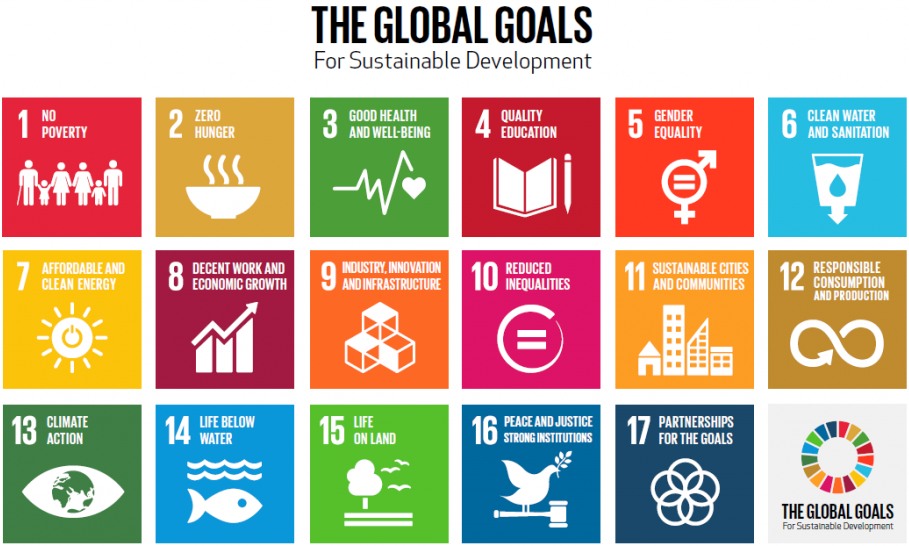
10. Also welcomes the adoption by the contracting parties to the Convention for the Protection of the Marine Environment and the Coastal Region of the
Mediterranean (Barcelona Convention) at its eighteenth ordinary meeting, held in Istanbul, Turkey, from 3 to 6 December 2013, of the Regional Action Plan on Marine Litter Management, the world’s first such action plan, and welcomes the draft Action Plan on Marine Litter for the North-East
Atlantic region awaiting adoption by the Commission of the Convention for the Protection of the Marine Environment of the North-East Atlantic at its meeting in Cascais, Portugal, and encourages Governments to collaborate through relevant regional seas conventions and
river commissions with a view to adopting such action plans in their regions;
11. Requests the Executive Director to support countries, upon their request, in the development and implementation of national or regional action plans to reduce marine litter;
12. Welcomes the initiative by the Joint Group of Experts on the Scientific Aspects of Marine Environmental Protection to produce an assessment report on microplastics, which is scheduled to be launched in November 2014;
13. Also welcomes the work undertaken by the International Whaling Commission on assessing the impacts of marine debris on cetaceans and the endorsement by the Conference of the Parties to the Convention on the Conservation of Migratory Species of Wild Animals at its tenth meeting of resolution 10.4, addressing the impacts of marine debris on migratory species; 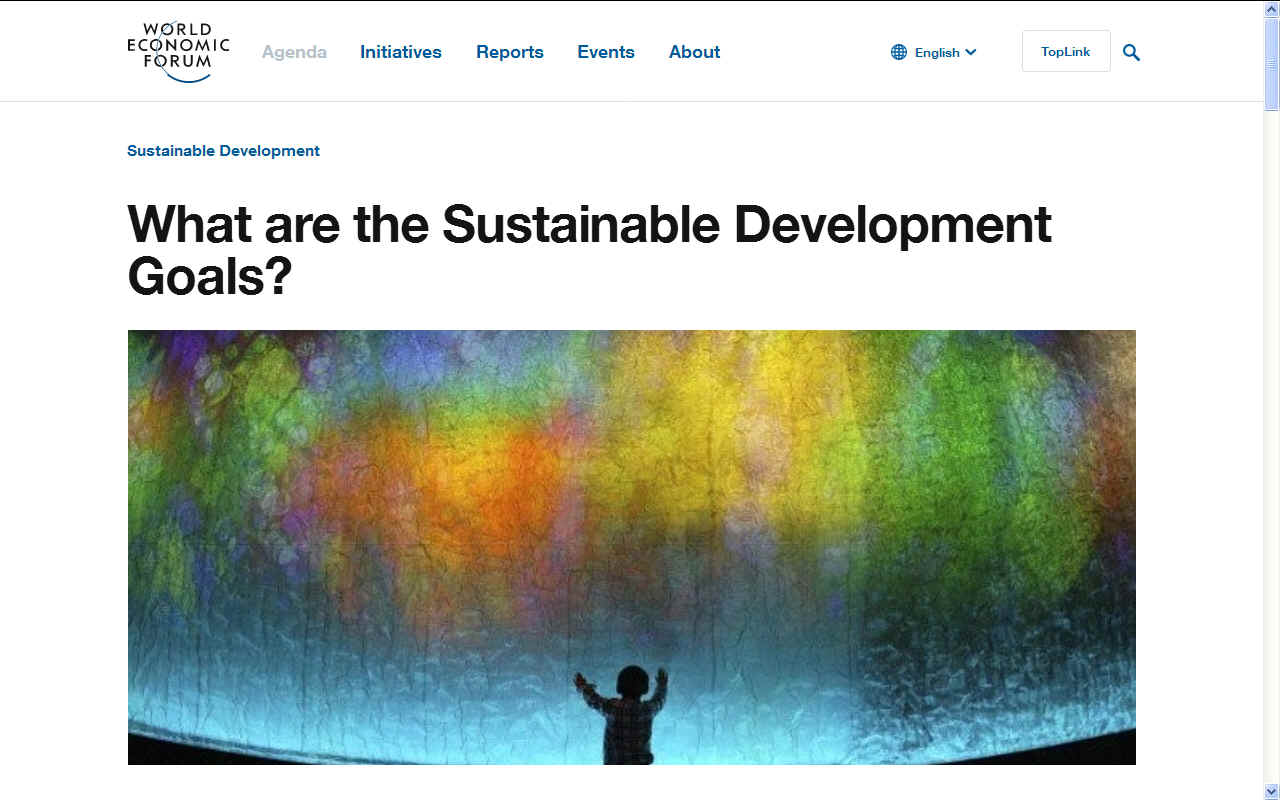
WORLD ECONOMIC FORUM
16
SEP 2015 - “I am pleased to share some good news for people and planet,” UN Secretary-General Ban Ki-moon said to a packed room of press delegates. The good news? After three years of negotiations and debate, 193 countries had agreed to a set of development goals more bold and ambitious than anything that has come before them.
The 17 Sustainable Development Goals (SDGs) – part of a wider 2030 Agenda for Sustainable Development – build on the Millennium Development Goals (MDGs). These eight goals, set by the United Nations back in 2000 to eradicate
poverty,
hunger, illiteracy and disease, expire at the end of this year.
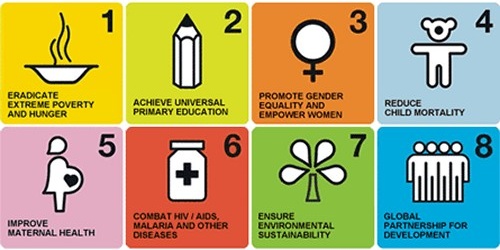
The MDGs were concrete, specific and measurable, and therefore helped establish some priority areas of focus in international development. But that was also one of their biggest criticisms: by being so targeted, they had left out other, equally important, areas.
Despite the criticism, significant progress has been made over the past 15 years, especially when it comes to the goals of eradicating poverty and improving access to education. That progress, however, has been very uneven, with improvements often concentrated in specific regions and among certain social groups. A 2015 UN assessment of the MDGs found they fell short for many people: “The assessment of progress towards the MDGs has repeatedly shown that the poorest and those disadvantaged because of gender, age, disability or ethnicity are often bypassed.”
In developing the SDGs – a multi-year process involving civil society, governments, the private sector and academia – the United Nations sought to take all these failings into account. So how, then, were these new goals reached and what do they look like?
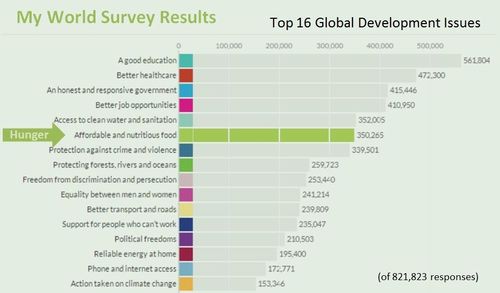
17 goals for ‘people and planet’
-
In response to the accusation that the MDGs were too narrow in focus, the SDGs set out to tackle a whole range of issues, from gender inequality to climate change. The unifying thread throughout the 17 goals and their 169 targets is the commitment to ending poverty: “Eradicating poverty in all its forms and dimensions, including extreme poverty, is the greatest global challenge and an indispensable requirement for sustainable development,” notes the agenda’s preamble.
As well as being more all-encompassing than the MDGs, the consultation process was also much more inclusive – Ban Ki-moon called it the “most transparent and inclusive process in UN history”. An unprecedented effort was made to get the input of as many people as possible, particularly those who wouldn’t normally be consulted for this type of international agreement. In total, 5 million people from across 88 countries in all the world’s regions took part in the consultation, and shared their vision for the world in 2030. This is very different from the development and implementation of the MDGs, which one expert described as “an internal UN bureaucratic creation”.
But what really sets apart the SDGs from their predecessors is their universal nature. Recognizing that the MDGs failed certain people and countries, the 2030 agenda sets out to “reach the furthest behind first” and concludes with a pledge that “no one will be left behind”.
From words to deeds -
Getting consensus on such a broad development agenda was an achievement in itself, but the real work will start in January, when it kicks in. “We have a big, bold agenda before us. Now we must work to make it real,” said the UN secretary-general. How, exactly, does the United Nations plan to do so?
Goal 17 goes into detail about that. It allows for a range of measures, including financial support and debt relief, the transfer of technologies and scientific know-how to developing nations on favourable terms, and the establishment of an open, non-discriminatory and equitable trading system to help developing nations increase their exports.
But the most important way of achieving the SDGs was touched upon in the UN press conference: “We will need all partners to make this a success.” Multistakeholder partnerships, involving government, the private sector and civil society, have been described as the “glue” that will hold this process together, and will be the only way of ensuring these incredibly ambitious goals are met.
By Stéphanie Thomson
14. Requests the Executive Director, in consultation with other relevant institutions and stakeholders, to undertake a study on marine
plastic debris and marine microplastics, building on existing work and taking into account the most up-to-date studies and data, focusing on: (a) Identification of the key sources of marine plastic debris and microplastics;
(b) Identification of possible measures and best available techniques and environmental practices to prevent the accumulation and minimize the level of microplastics in the marine environment;
(c) Recommendations for the most urgent actions;
(d) Specification of areas especially in need of more research, including key impacts on the environment and on human health;
(e) Any other relevant priority areas identified in the assessment of the Joint Group of Experts on the Scientific Aspects of Marine Environmental Protection; 15. Invites the secretariats of the Stockholm Convention on Persistent Organic Pollutants, the Basel Convention on the Control of Transboundary Movements of Hazardous Wastes and Their Disposal and relevant organizations involved in pollution control and chemicals and waste management and the secretariats of the Convention on Biological Diversity, the Convention on Migratory Species and the regional seas conventions and action plans to contribute to the study described in paragraph 14 of the present resolution;
16. Encourages Governments and the private sector to promote the more resource-efficient use and sound management of plastics and microplastics;
17. Also encourages Governments to take comprehensive action to address the marine plastic debris and microplastic issue through, where appropriate, legislation, enforcement of international agreements, provision of adequate reception facilities for ship-generated wastes, improvement of waste management practices and support for beach clean-up activities, as well as information, education and public awareness programmes;
18. Invites Governments, intergovernmental organizations, the scientific community, non-governmental organizations, the private sector and other stakeholders to share relevant information with the Executive Director pertinent to the study described in paragraph 14;
19. Invites those in a position to do so to provide financial and other support to conduct the study identified in paragraph 14;
20. Requests the Executive Director to present the study on microplastics for the consideration of the United Nations Environment Assembly at its second session.
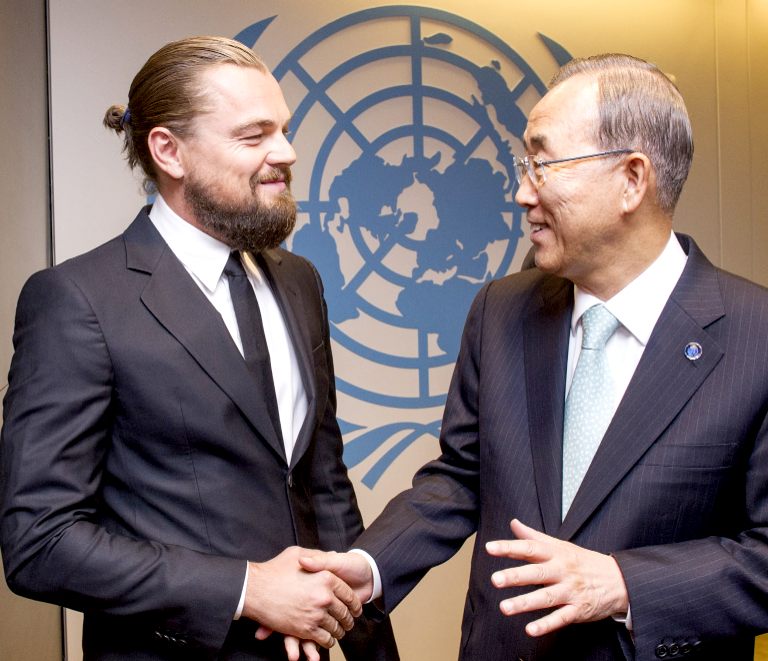
Leonardo
di Caprio and Ban Ki-moon met in New York at the UN summit on climate change.
Resolution S/60/L.22 (2005)
Oceans and the law of the sea
65. Notes the lack of information and data on marine debris, encourages relevant national and international organizations to undertake further studies on the extent and nature of the problem, also encourages States to develop partnerships with industry and civil society to raise awareness of the extent of the impact of marine debris on the health and productivity of the marine environment and consequent economic loss;
66. Urges States to integrate the issue of marine debris within national strategies dealing with waste management in coastal zone, ports and maritime industries, including recycling, reuse, reduction and disposal, and to encourage the development of appropriate economic incentives to address this issue, including the development of coastal recovery systems that provide an incentives to use port reception facilities and discourage ships form discharging marine debris at sea, and encourages States to cooperative regionally and
sub-regionally to develop and implement joint prevention and recovery programme for marine debris;
67. Invites International Maritime Organization, in consultation with relevant organizations and bodies, to review annex V to the International Convention for the Prevention of Pollution from Ships 1973, as modified by the Protocol of 1978 relating thereto, and to assess its effectiveness in addressing sea-based sources of marine debris;
68. Welcomes the continued work of the International Maritime Organization relating to port waste reception facilities, and notes the work done to identify problem areas and develop an action plan addressing inadequacy of such facilities;
69. Calls upon States to take all appropriate measures to control, reduce and minimize, to the fullest extent possible, marine pollution from land-based sources as part of their national sustainable development strategies and programmes, in an integrated and inclusive manner, and to advance the implementation of the Global Programme of Action for the Protection of the Marine Environment from Land-based Activities and the Montreal Declaration on the Protection of the Marine Environment from
Land-based
Activities;
70. Welcomes the convening of the Second Intergovernmental Review Meeting of the Global Programme of Action in Beijing from 16 to 20 October 2006 as an opportunity to discuss marine debris in relation to the sources categories of the Global Programme of Action, and urges broad high-level participation;
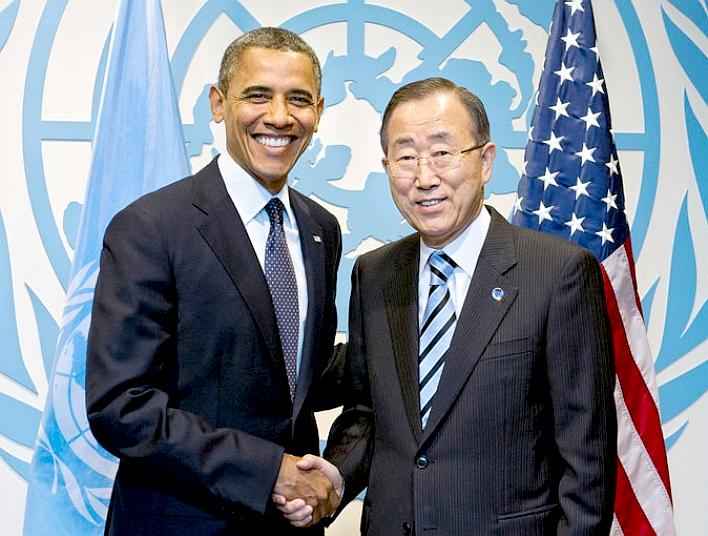
UN NEWS CENTRE
- 7 November 2012 – United Nations Secretary-General Ban Ki-moon warmly congratulated President Barack Obama on his re-election as President of the United States, a spokesperson for the world body's head said overnight.
“The Secretary-General looks forward to continuing to work with President Obama and his administration in the spirit of the enduring partnership between the United States and the United Nations,” Mr. Ban's spokesperson added in a statement.
According to media reports, while some results have yet to be finalized, President Obama defeated his opponent, Mitt Romney, with 303 electoral college votes compared to Mr. Romney's 206 electoral college votes. Under the US presidential voting system, a candidate needs to secure at least 270 electoral college votes to secure victory.
“Many challenges lie ahead – from ending the bloodshed in Syria, to getting the Middle East peace process back on track, to promoting sustainable development and tackling the challenges posed by climate change,” the spokesperson noted. “All will require strong multilateral cooperation.”
“The Secretary-General and the United Nations will continue to count on the active engagement of the United States on these and other crucial issues as it strives to meet the hopes and expectations of people around the
world.” Ban Ki-moon is seen above with US President Barack Obama at UN Headquarters in September 2012.
Photo ref: Mark Garten UN.
Resolution A/60/L. 31 (2005)
Sustainable fisheries, including through the 1995 Agreement for the Implementation of the Provisions of the
United Nations Convention on the Law of the Sea of 10 December 1982 relating to the Conservation and Management of Straddling
Fish Stocks and Highly Migratory Fish Stocks, and related instruments
77. Calls upon States, the Food and Agriculture Organization of the United Nations, the International Maritime Organization, the
United Nations Environment Programme, in particular its Regional Seas programme, regional and subregional fisheries management organizations and arrangements and other appropriate intergovernmental organizations that have not yet done so to take action to address the issue of lost or abandoned fishing gear and related marine debris, including through the collection of data on gear loss, economic costs to fisheries and other sectors, and the impact on
marine
ecosystems;
78. Encourages close cooperation and coordination, as appropriate, between States, relevant intergovernmental organizations, United Nations programmes and other bodies, such as the Food and Agriculture of the United Nations, the International Maritime Organization, the United Nations Environmental Programme, the Global Programme of Action, the Regional Seas arrangements, regional and subregional fisheries management organizations and arrangements and relevant stakeholders, including non-governmental organizations, to address the issue of lost and discarded fishing gear and related marine debris, through initiatives such as analysis of the implementation and effectiveness of the existing measures relevant to the control and management of derelict fishing gears and related marine debris, the development and implementation of targeted studies to determine the socio-economic, technical and other factors that influence the accidental loss and deliberate disposal of fishing gear at sea, the assessment and implementation of preventive measures, incentives and/or disincentives relating to the loss and disposal of
fishing gear at sea, and the development of best management practices;
79. Encourages States, directly and through regional and subregional fisheries management organizations and arrangements, and in close cooperation and coordination with relevant stakeholders, to address the issue of lost and discarded fishing gear and related marine debris, through initiatives including developing and implementing joint prevention and recovery programmes, establishing a clearing-house mechanism to facilitate the sharing of information between States on fishing net types and other fishing gear, the regular, long-term collection, collation and dissemination of information on derelict fishing gear, and national inventories of net types and other fishing gear, as appropriate;
80. Encourages States, the United Nations Environmental Programme, the Global Programme of Action, the Food and Agriculture Organization of the United Nations, the International Maritime Organization, subregional and regional fisheries management organizations and arrangements and other relevant intergovernmental organizations and programmes to consider the outcomes of the Asia-Pacific Economic Cooperation Education and Outreach Seminar on Derelict Fishing Gear and Related Marine Debris, held in January 2004, and how they may be implemented;
81. Encourages States to raise awareness within their fisheries sector and subregional and regional fisheries management organizations and arrangements of the issues of derelict fishing gear and related marine debris and to identify options for action;
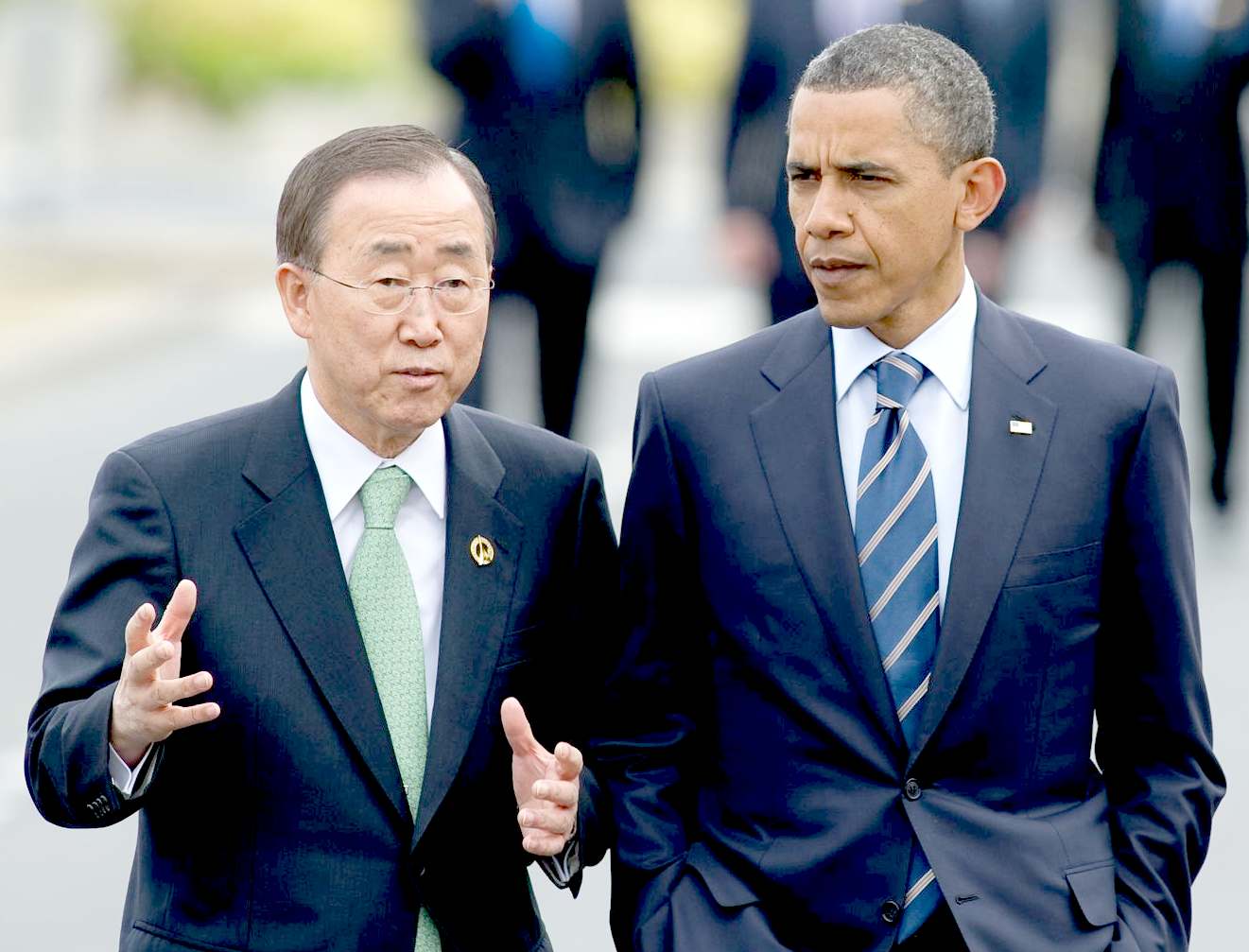
Resolution A/63/L.42 (2008)
Oceans and the law of the sea
16. Also recognizes the need to build the capacity of developing States to raise awareness of and support the implementation of improved waste management practices, noting the particular vulnerability of small island developing States to the impact of marine pollution from land-based sources and marine debris;
106. Welcomes the activities of the United Nations Environment Programme relating to marine debris carried out in cooperation with relevant
United Nations bodies and organizations, and encourages States to further develop partnerships with industry and civil society to raise awareness of the extent of the impact of marine debris on the health and productivity of the marine environment and consequent economic loss;
107. Urges States to integrate the issue of marine debris into national strategies dealing with waste management in the coastal zone, ports and maritime industries, including recycling, reuse, reduction and disposal, and to encourage the development of appropriate economic incentives to address this issue, including the development of cost recovery systems that provide an incentive to use port reception facilities and discourage ships from discharging marine debris at sea, and encourages States to cooperate regionally and subregionally to develop and implement joint prevention and recovery programmes for marine debris. Resolution A/63/L.43 (2008)
Sustainable fisheries, including through the 1995 Agreement for the Implementation of the Provisions of the United Nations Convention on the Law of the Sea of 10 December 1982 relating to the Conservation and Management of Straddling Fish Stocks and Highly Migratory Fish Stocks, and related instruments
111. Reaffirms the importance it attaches to paragraphs 77 to 81 of resolution 60/31 concerning the issue of lost, abandoned, or discarded
fishing gear and related marine debris and the adverse impacts such debris and derelict fishing gear have on, inter alia, fish stocks, habitats and other marine species, and urges accelerated progress by States and regional fisheries management organizations and arrangements in implementing those paragraphs of the resolution.
UNITED
NATIONS SECRETARIES-GENERAL
| Secretary-General |
Nationality |
Dates in Office |
| - |
- |
- |
| Trygve Halvdan Lie |
Norwegian |
1946 –
53 |
| Dag Hammarskjöld |
Swedish |
1953 –
61 |
| U Thant |
Burmese |
1962 –
71 |
| Kurt Waldheim |
Austrian |
1972 –
81 |
| Javier Pérez de Cuéllar |
Peruvian |
1982 –
91 |
| Boutros Boutros-Ghali |
Egyptian |
1992 –
96 |
| Kofi Annan |
Ghanaian |
1997 –
2006 |
| Ban Ki-Moon |
South Korean |
2007 –
16 |
| António Guterres |
Portuguese |
2017 – |
GLOBAL
OCEAN COMMISSION - CO-CHAIRS
|

|
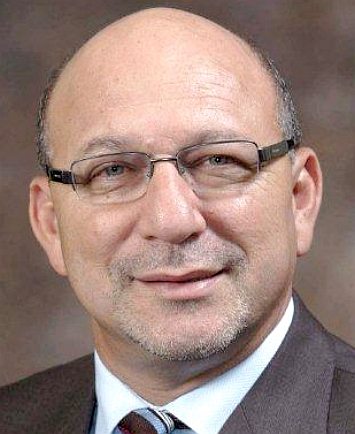
|
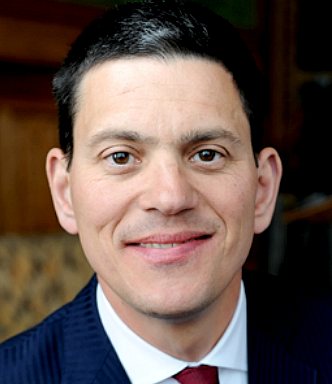
|
|
José María Figueres |
Trevor Manuel |
David
Miliband |
THE
GLOBAL OCEAN
COMMISSIONERS
|

|
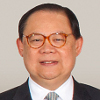
|
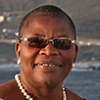
|

|
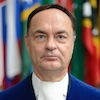
|

|

|
|
Carol
Browner |
Victor
Chu |
Obiageli Ezekwesili |
Luiz
Furlan |
Vladimir
Golitsyn |
Robert
Hill |
Yoriko
Kawaguchi |
|
. |
. |
. |
. |
. |
. |
. |
|

|

|
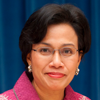
|

|

|
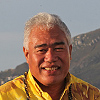
|

|
|
Pascal
Lamy |
Paul
Martin |
Sri
Mulyani Indrawati |
Cristina
Narbona |
Ratan
Tata |
Foua
Toloa |
Andrés
Velasco |
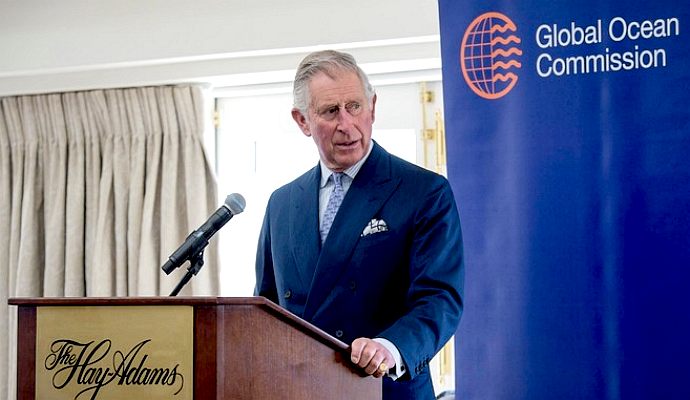
HRH
the Prince of Wales speaking at a Global Ocean Commission event in Washington DC
in March of 2015. The future King of England has consistently kept a
weather eye open to help safeguard the marine environment. Prince Charles
also met with President
Obama on this visit to the USA. The US President is quoted as saying
that climate change is one of the greatest threats to security.
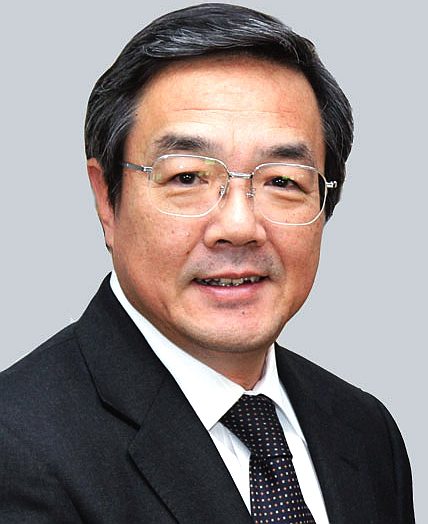

LEFT
- IMO
Secretary General: Koji Sekimizu has welcomed the recently-published report of the Global Ocean Commission
(GOC), From Decline to
Recovery RIGHT - Prince Albert II of Monaco
is a supporter of the Global Ocean Commission

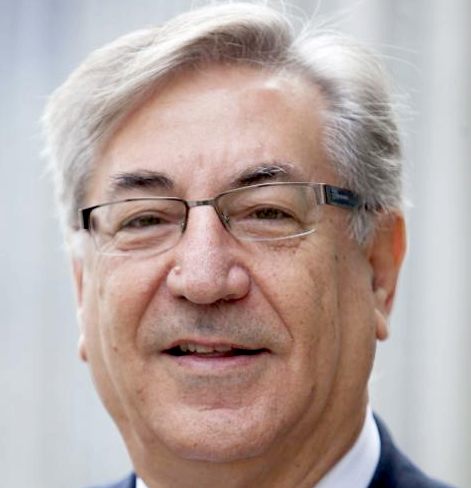
POPE
FRANCIS - Refreshingly, Pope
Francis embraces the need to tend our gardens is Christian manner, and
our duty to do what we can. He is quoted as saying: “If we destroy
Creation, Creation will destroy us.” KARMENU
VELLA - is the Commissioner for Environment, Maritime Affairs and
Fisheries at the Directorate-General for Maritime Affairs and Fisheries (also known in short as DG MARE).
The Commission is responsible for the implementation of the Common Fisheries policy and of the Integrated Maritime Policy.
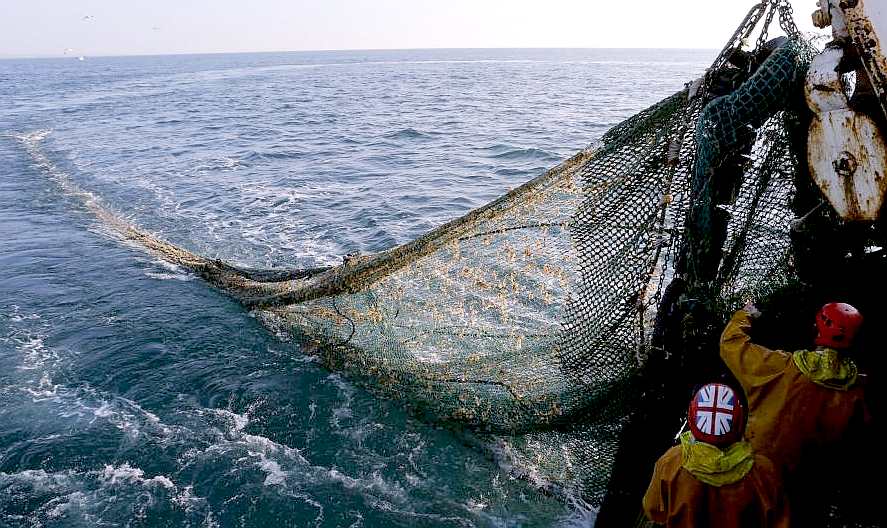
RICH COUNTRIES PAY ZOMBIES $5 BILLION A YEAR IN SUBSIDIES TO PLUNDER THE OCEANS
- The industrial fleet that now drags the high seas for fish has a combined engine power 10 times stronger than it did in 1950. Its nets are so huge that they’re sometimes big enough to hold 12 jumbo jets. And it is largely thanks to this all-out assault on high-seas fishing stocks that two-thirds of those stocks
(paywall) are at the brink of collapse - or well past the edge.
But instead of discouraging this trend, rich countries are paying those vessels to
over-fish like there’s no tomorrow. Japan, China, the US, the EU and other countries pay $27
billion to subsidize these vessels, according to a report
by the Global Ocean Commission, an independent body of international leaders focused on ocean conservation policy. Of that, $5 billion alone goes on fuel subsidies from rich countries to industrial fishing fleets. 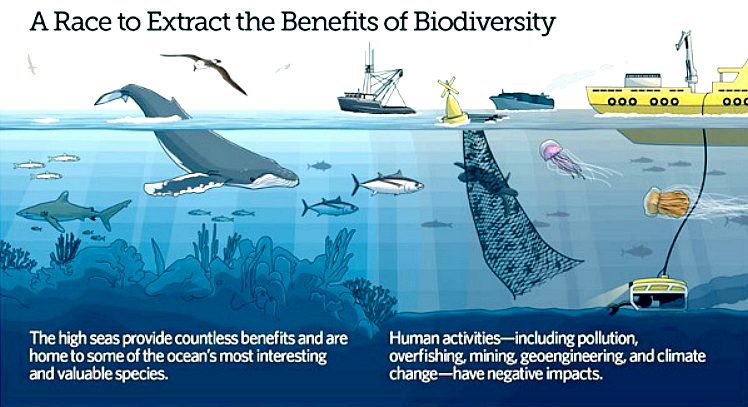



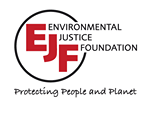

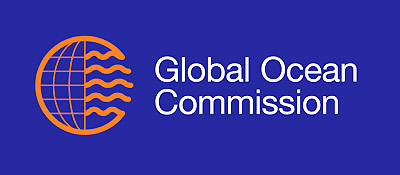
LINKS
& REFERENCE
Forbes
profile Ban Ki-moon
United
Nations UN biography
The
guardian.com/worl news Ban Ki-moon
Ban_Ki-moon
Mission
ocean
European_Commissioner_for_Maritime_Affairs_and_Fisheries
Globaloceancommission
Time
Magazine HRH Prince Charles Wales environmental ocean speech
Global_Ocean_Commission
http://www.itv.com/news/2015-03-18/prince-charles-makes-impassioned-plea-for-oceans-clean-up/
http://www.tescoplc.com/index.asp?pageid=596
http://www.forbes.com/profile/ban-ki-moon/
http://www.un.org/sg/biography.shtml
http://www.theguardian.com/world/ban-ki-moon
http://en.wikipedia.org/wiki/Ban_Ki-moon
http://missionocean.me/
http://en.wikipedia.org/wiki/European_Commissioner_for_Maritime_Affairs_and_Fisheries
http://www.globaloceancommission.org/
http://time.com/3750375/environment-prince-charles-oceans/
http://en.wikipedia.org/wiki/Global_Ocean_Commission
http://www.itv.com/news/2015-03-18/prince-charles-makes-impassioned-plea-for-oceans-clean-up/
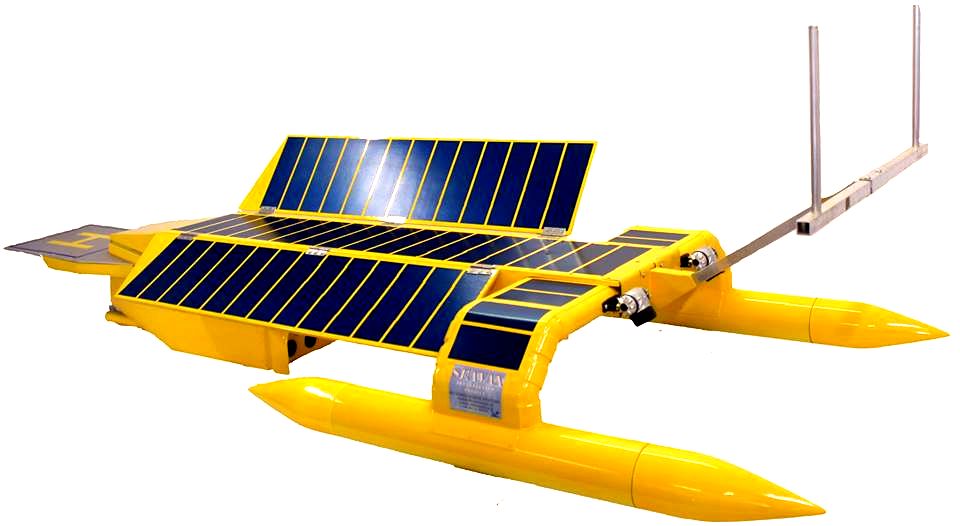
UN
CONCERNS ON MARINE LITTER - In the Rio+20 outcome document, marine litter/debris is considered as one of the major concerns as it negatively affects the health of oceans and marine biodiversity, therefore it calls for actions to achieve significant reductions in marine debris by
2025 to prevent harm to the coastal and marine environment (paragraph 163 of The Future We Want). In The Oceans Compact which was launched during the Yeosu Expo 2012, UN Secretary General Ban Ki-moon further calls upon all countries to set relevant national targets for nutrients, marine debris and waste water to protect people and improve the health of the oceans.
Recalling the concern reflected in “The future we want”, the United Nations Environment Assembly of UNEP at its first session adopted on 27 June 2014 the resolution 1/6 on Marine plastic debris and microplastics.
Marine litter (debris) issue was addressed at the 60th and 63rd UN General Assembly held in October 2005 and in September 2008, respectively, and was reflected in
the resulting resolutions.
As
part of the drive to clean up our oceans, one hopes that projects to
target plastics that leak into the oceans despite improved land waste measures, might receive
recognition and support. One such
project is the Cleaner Oceans Project that plans to develop ocean scrubbers
based on the 'proof of concept' boat seen above. Contact
BMS for more information.
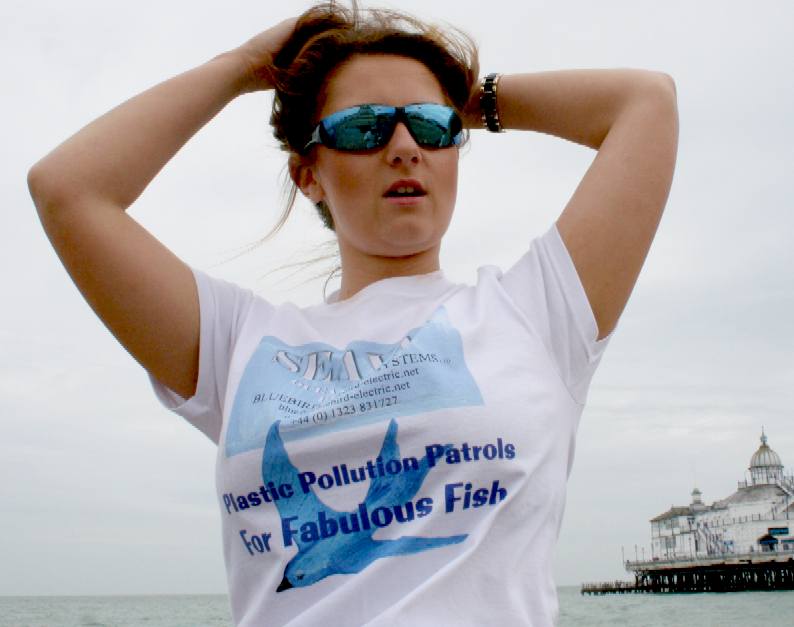
ACID
OCEANS - ARCTIC
- ATLANTIC - BALTIC
- BERING
- CARIBBEAN - CORAL - EAST
CHINA - ENGLISH CH
GOC
- GULF
MEXICO
- INDIAN
- MEDITERRANEAN -
NORTH SEA - PACIFIC
- PERSIAN GULF - SEA
JAPAN - STH
CHINA
PLANKTON
- PLASTIC
- PLASTIC
OCEANS - UNCLOS
- UNEP
- WWF
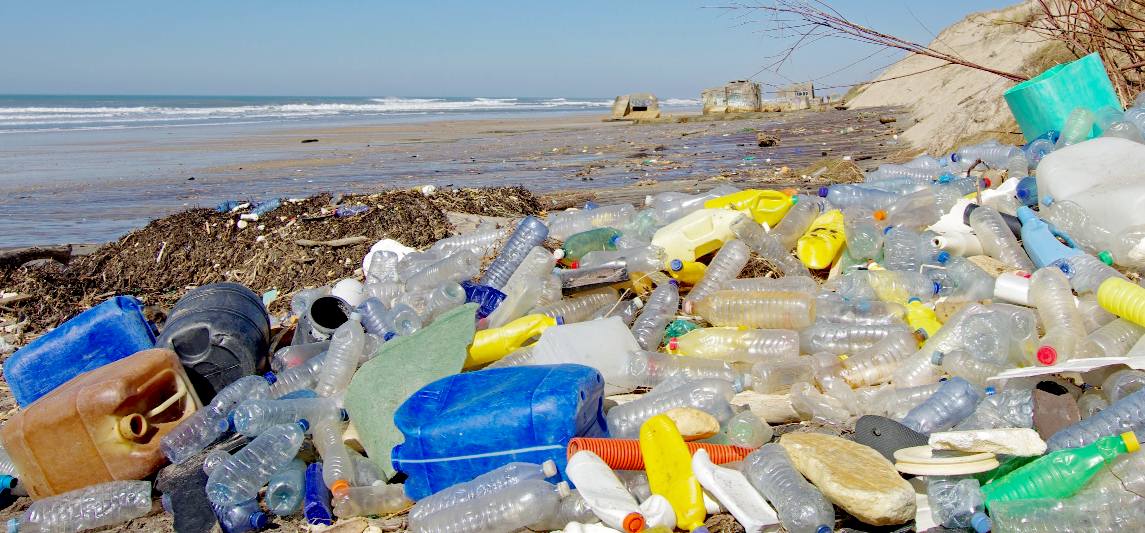
|




































